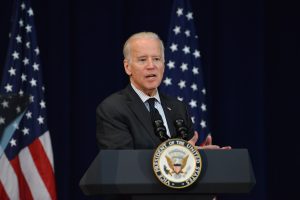Now that Vice-President Joe Biden is set to become the next U.S. president in January 2021, attention is turning to the makeup of his cabinet. Key figures, including those responsible for foreign policy, include Obama Administration veterans, who will be charged with helping to strengthen relations, particularly with America’s allies.
For Japan, the Japan–U.S. alliance has been relatively stable, partly thanks to the good personal rapport between former Prime Minister Abe Shinzo and President Donald Trump, but this has not dispelled worries within Japan about its burden given Trump’s disdain for the U.S. role as “the world’s policeman.” In fact, the U.S. alliance is more important than ever before for Japan, which must address national security concerns in the face of a rising China while dealing with the threat from North Korea. Beyond security, economic and technological relations with America are also critical for Japan. Moreover, the U.S. network of allies, the Free and Open Indo-Pacific (FOIP) strategy, and the Quadrilateral Security Dialog (Quad) are important assets for Japan, and the new administration is likely to continue with these assets in practice, even if some name changes may be introduced.
Nonetheless, it is worth paying attention to what we might call a “misunderstanding” about the new U.S. administration that has been perpetuated in the Japanese media. That misunderstanding is the worry that Washington will once again reach out to China and put Japan in a difficult position, and it comes from memories of the former Obama administration’s comparatively friendly relations with China. Naturally, experts have analyzed the writings and statements of the people thought to be the brains behind the Democratic Party’s foreign affairs and are well aware that the image of China within the Democratic Party is very different from that which the Obama administration held. Even so, this “misunderstanding” still seems to hold considerable sway within Japan.
Some months after Xi Jinping took office as Chinese president, in June 2013 he attended an unofficial summit meeting with his U.S. counterpart Barack Obama in Sunnylands, California. There, the two heads of state agreed to forge a “new type of great power relations.” After the meeting, Chinese State Councilor Yang Jiechi spoke at a press briefing and announced the Chinese understanding of these new great power relations, saying that they would build a relationship of “no conflict and confrontation,” “mutual respect” for each other’s “social system and development road” and “core interests and major concerns,” and “win–win cooperation.”
In his own comments, Obama indicated that he had not said that they would build a “new type of great power relations” but instead expressed it as something akin to a new model for U.S.–China relations. However, at the U.S.–China summit meeting that was held in connection with the G20 in September 2013, Obama stated that “we agreed to continue to build a new model of great power relations based on practical cooperation and constructively managing our differences.” This was interpreted as a sign of the Obama administration moving closer to China, but what elicited the biggest reaction in Japan was an address by the then U.S. national Security Advisor Susan Rice on the Obama administration’s American policy toward Asia at the George Washington University on November 20, 2013. In particular, commenting on U.S.–China relations Rice said that “we seek to operationalize a new model of major power relations.” Obama had already used the words “a new model of major power relations,” but this second usage gave the impression that the “new model of major power relations” had been incorporated into Washington’s China policy. Japanese experts at the venue conveyed the remarks to the academic community in Japan, and they were subsequently reported in the media. The upshot was that henceforth Japan had the strong impression that Rice is “pro-China.”
Of course, Rice was in no way taking “pro-China” action. For one thing, in December of the same year she gave another address titled “Human Rights: Advancing American Interests and Values,” where she said that the Chinese people faced restrictions on freedoms of expression, assembly, and association, and criticized China for imprisoning political protestors and denying ethnic and religious minorities fundamental freedoms.
Yet even though it is a misunderstanding, the impression of Democratic Party softness on China* persists in Japan. It is likewise true that eyes on the new administration’s China policy are accompanied by a degree of worry in China’s neighbors. What is common sense in the corridors of Washington is not necessarily so in faraway East Asia, so it may well be necessary for Biden’s new administration to once more critically examine the Obama administration’s China policy and explain its policy to Japan and China’s other East Asian neighbors.
Already in a meeting with Prime Minister Yoshihide Suga, Biden spoke about applying Article 5 of the Japan–US Security Treaty to the Senkaku Islands. These comments received wide and approving coverage in Japan, which itself is evidence of lingering Japanese concerns about the policies of the new U.S. leadership.
Shin Kawashima is a professor at the University of Tokyo.
*Corrected from “Japan”.

































